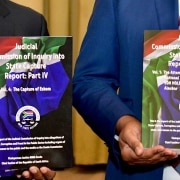|
Getting your Trinity Audio player ready...
|
Corruption Watch will appear as amicus curiae on Tuesday, 5 September 2017, in the EFF’s Constitutional Court application inquiring into Parliament’s failure to hold President Jacob Zuma accountable. The matter follows on the Nkandla judgment, delivered on 31 May 2016, relating to a case that had been brought forward by the party, with the DA, Cope and UDM, against National Assembly Speaker Baleka Mbete. Corruption Watch was amicus in that matter too.
The Nkandla judgment found that Zuma had violated the Constitution in the manner in which he responded to the Public Protector’s report on upgrades to his Nkandla homestead. He was also found to have violated his oath of office. Mbete was accused of failing in her oversight role in the matter.
The opposition parties applied in March this year to compel Parliament to hold Zuma accountable for violations of the Constitution as well for violating his oath of office. The DA applied in August for leave to intervene as the fourth applicant to these proceedings, and its application was granted.
Corruption Watch was granted leave to intervene as amicus in the current matter. It contends, together with the other applicants, that there is a duty imposed on Parliament to scrutinise the conduct of the president and to require him to account for his well-established violations of the Constitution. It submits that this necessarily means that an objective investigation into his conduct must be carried out before any impeachment process is initiated. Corruption Watch relies on various rules of the National Assembly to justify such conclusion as well as on comparative examples in the US and Brazil to illustrate that impeachment processes are ordinarily foreshadowed by in-depth investigations.
Mbete’s team contends that it has complied with its oversight obligations because the National Assembly has debated and voted on a motion to remove the president from office and also debated and voted on a motion of no confidence in him.
The key question to be posed at Tuesday’s hearing is whether Parliament has taken adequate action to hold Zuma accountable in accordance with the National Assembly’s obligation to scrutinise executive action.
Accountability, transparency and openness in relation to executive oversight are core to the mandate of Corruption Watch, as a Transparency International chapter in South Africa. We look forward to the ventilation and debate of the nature and extent of Parliament’s obligations in the highest court in the land. The hearing is scheduled to start at 10h00.
Download documentation:
- Corruption Watch intervention request
- CCT 76-17 EFF and Others v The Speaker (Corruption Watch Directions)
- CCT 76-17 EFF and Others v The Speaker and Another (Corruption Watch Order)
- CCT 76-17 EFF and Others v The Speaker and Another ( DA directions)
- CCT 76-17 EFF and Others v The Speaker and Another (DA Court order)
- Corruption Watch\s final submissions
- EFF’s heads of argument
- UDM and Cope’s heads of argument
- First respondent’s heads of argument
- First respondent’s supplementary heads of argument
Contact:
Phemelo Khaas: phemelok@corruptionwatch.org.za 083 763 3472
Patience Mkosana: patiencem@corruptionwatch.org.za 072 992 8380








